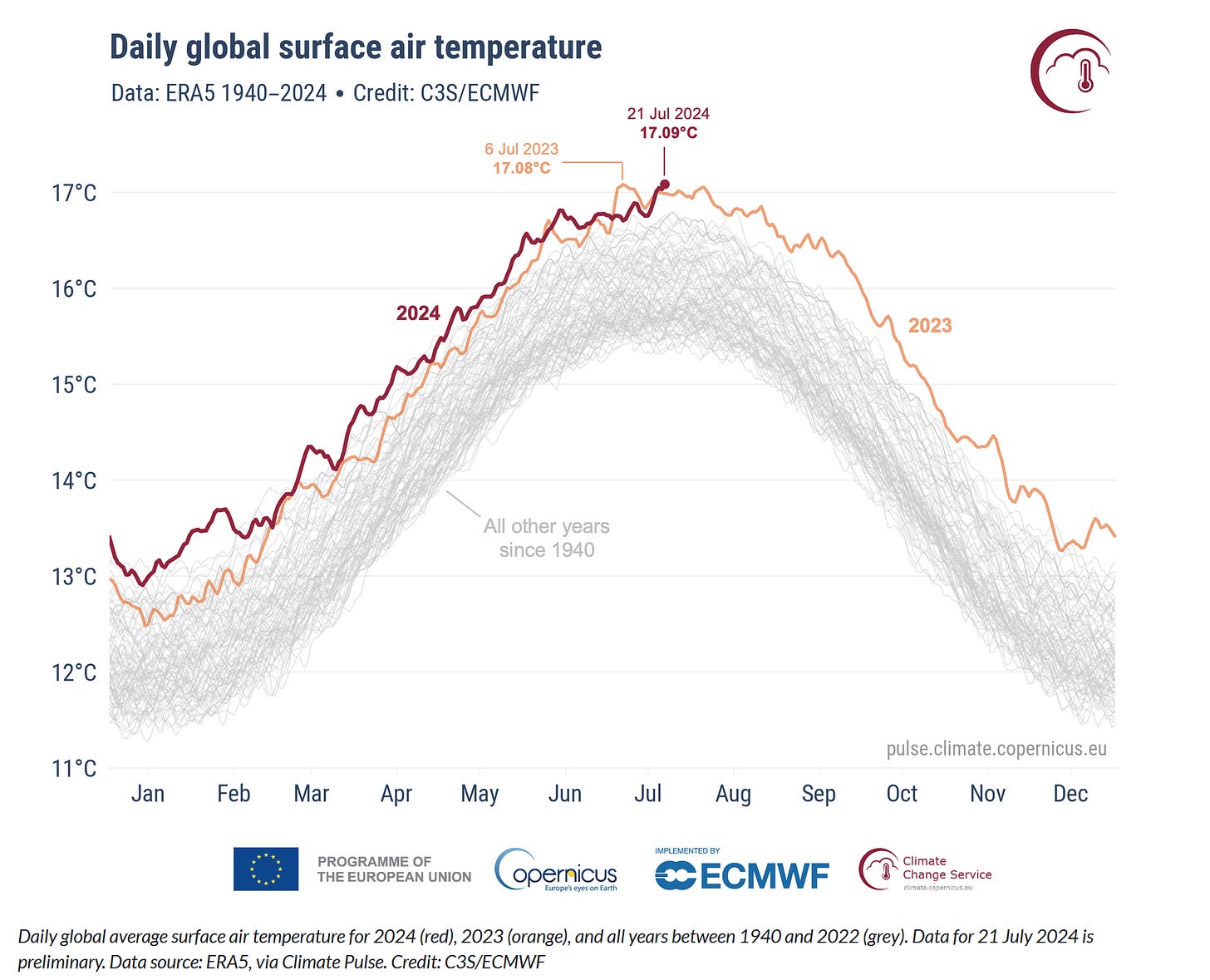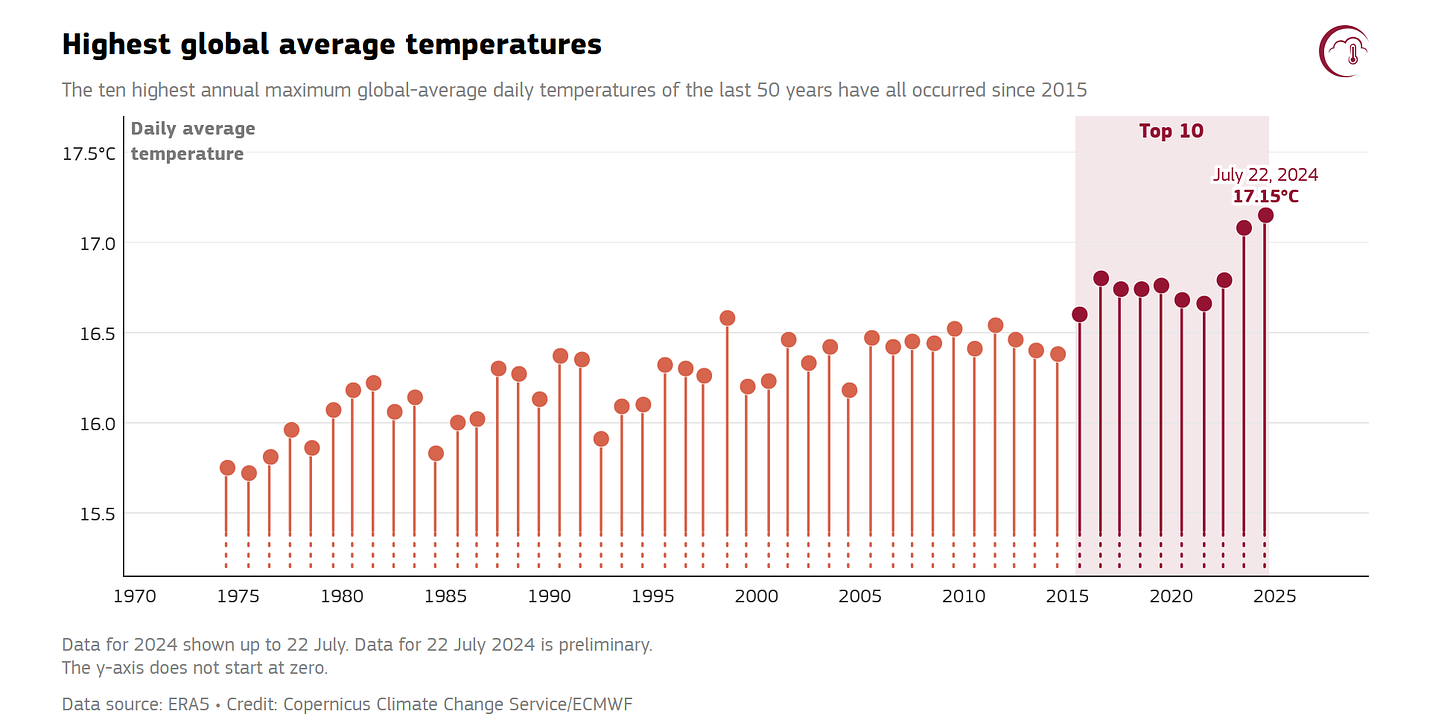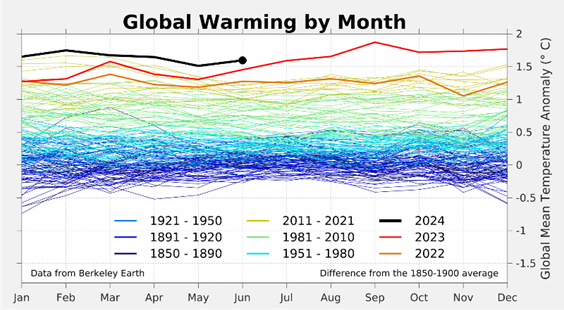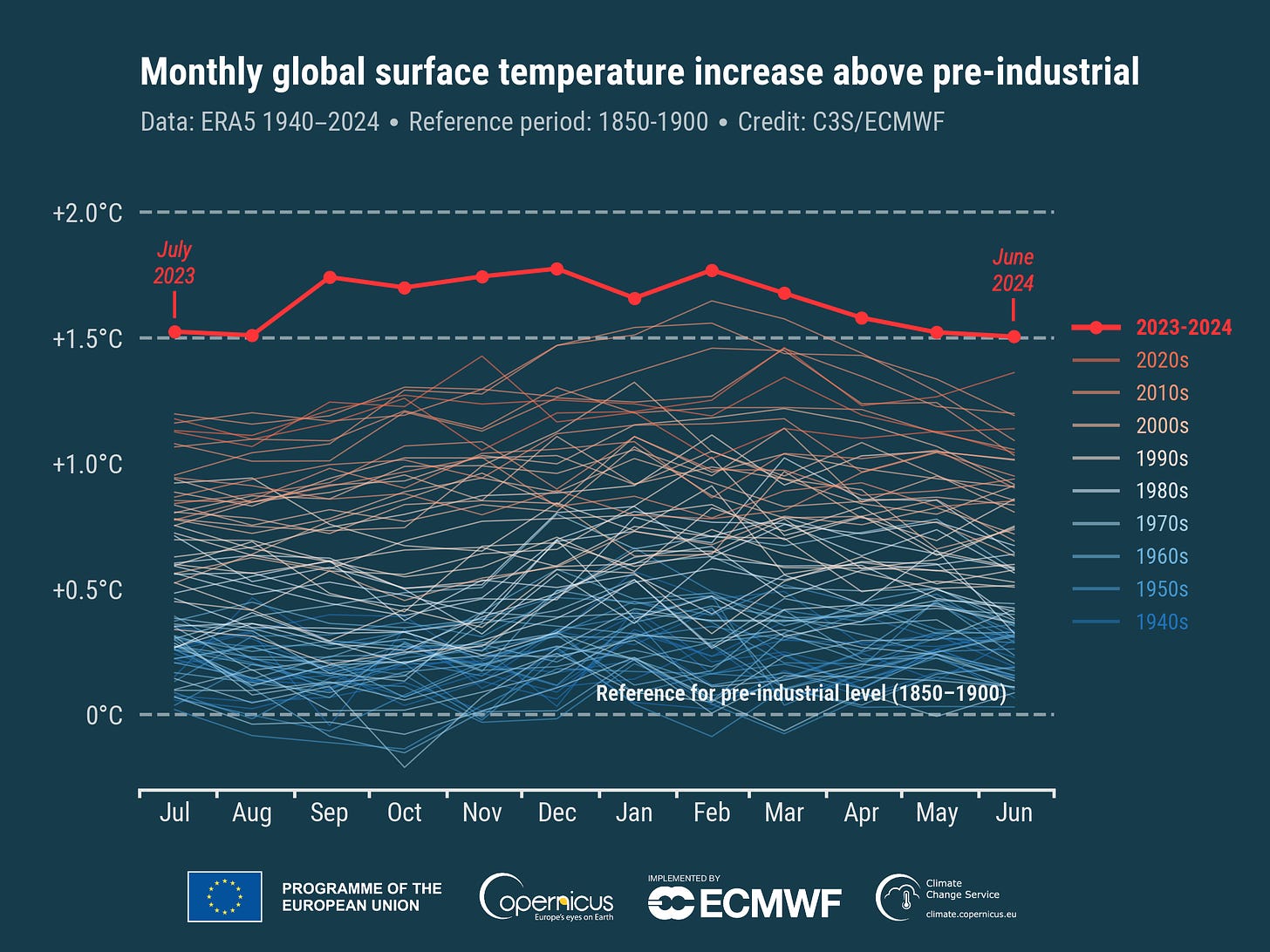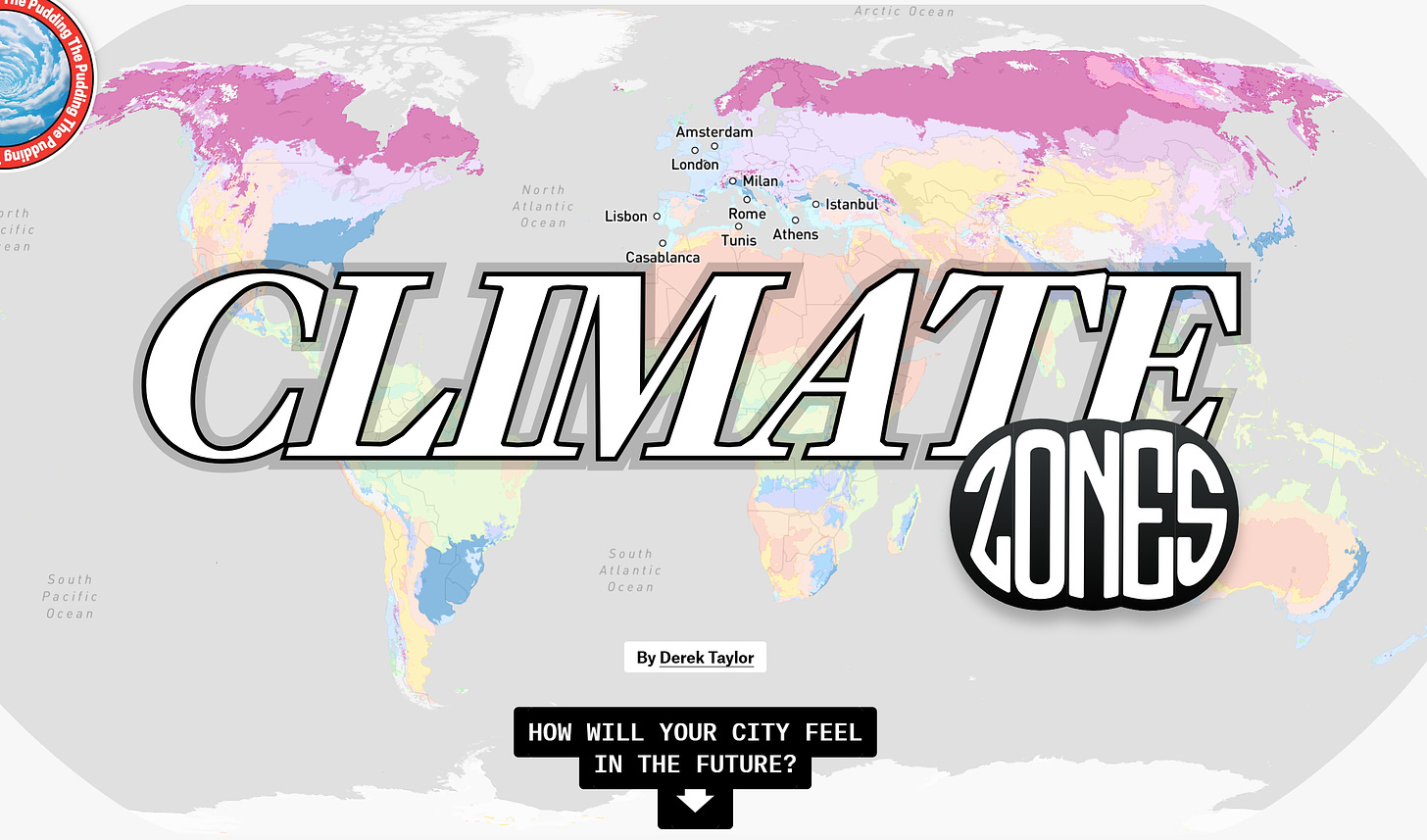New record daily global average temperature reached in July 2024
The Earth has just experienced its warmest day in recent history, according to the Copernicus Climate Change Service (C3S) data. On 21 July 2024, the daily global average temperature reached 17.09°C, slightly exceeding the previous record of 17.08°C from 6 July 2023.
While I was writing these lines, the Copernicus Climate ERA5 published its preliminary data which shows that Monday, 22, was the warmest day in recent history, at 17.15°C, breaking the record from 21 July.
Annual maximum daily global average temperatures in the ERA5 record for the past 50 years (1974 to 2024). The ten highest annual maximum temperatures are highlighted in dark red. Data for 21 July 2024 is preliminary, and data for 2024 is available up to 21 July 2024. Data source: ERA5. Credit: C3S/ECMWF.
Every day, a new record … This is a crisis, and I am bewildered by the lack of urgency.
The Warmest June and 13 Consecutive Months of Record High Temperatures
June 2024 has become the warmest June on record since measurements began in 1850, surpassing the previous records for the warmest June, set in 2023, by 0.14 °C (0.25 °F) - a margin that clearly exceeds the range of uncertainties.
Global Warming by Month Source: @Berkeley Earth
This is the 13th consecutive month of record-breaking temperatures. With the first half of the year behind us, and based on the current trajectory, 2024 is on course to become the warmest year on record.
According to Berkeley Earth, the global mean temperature in June 2024 was 1.60 ± 0.09 °C (2.87 ± 0.17 °F) above the 1850 to 1900 average. This is similar to other recent months, though less warm than the peak set last September. (see graph below)
We are likely at or near the peak of this warming event, as relative cooling is expected soon with the end of El Niño conditions. El Nino is a periodic, natural phenomenon that involves the unusual warming of surface waters in the eastern Pacific Ocean. Compared to the long-term trend, the current deviation is one of the largest on record. Other recent large El Niño events, such as 2016 and 1998, produced somewhat smaller deviations above the trend line. Only the 1878/88 Super El Niño presented a larger deviation than the current event.
Monthly global surface air temperature anomalies (°C) relative to 1850–1900 from January 1940 to June 2024, plotted as time series for all 12-month periods spanning July to June of the following year. The 12 months from July 2023 to June 2024 are shown
On The Hill’s Big Story on June 20, 2024, Jonathan Overpeck, dean of the School of Environment and Sustainability at the University of Michigan said “Now that El Nino has ended ‘we’re really looking at the next few months to tell us whether something dramatic is surprising us in global temperatures. If it starts cooling off [and] hasn’t started to do that yet, we can ascribe [these] more unusual temperatures to the El Nino. If it keeps rocketing up, we’ll have to think why climate change [is] accelerating.’” [emphases are in The Hill article]
Last year, Jim Hansen and colleagues published a paper in the research journal Oxford Open Climate Change, suggesting that the planet may warm faster than previously estimated. The latest assessment report from the U.N.’s Intergovernmental Panel on Climate Change (IPCC) shows a likely range of 2.5 to 4°C, with a central estimate of around 3°C. However, Hansen and co-authors suggest a central estimate of around 4.8 C, nearly 2 degrees higher than the IPCC’s figure. This assertion is based on evidence from Earth's ancient climate history, indicating that current climate models might not fully incorporate certain feedback effects. The paper has sparked significant debate within the scientific community, drawing both support and criticism.
What will it be like to live in your city — but in a warmer world?
150 years ago, German scientist Wladimir Köppen attempted to bridge the gap between climate and weather by using vegetation growth, average temperature, and precipitation levels to classify the world into five distinct climate zones: Arid, Tropical, Temperate, Cold, Polar
A 2018 study, led by climatologist Hylke Beck, used projected data from climate models along with the current Köppen Climate Classification to give a glimpse at what our world may look like in 2070.
Source: Climate Zones (pudding.cool)
This interactive analysis categorizes and tracks 70 cities between now and 2070 and predicts what living there will feel like as the planet heats up. Nearly 90 million people who live in temperate zones shift into harsher environments.
Watch Athens and Los Angeles turn from temperate now to arid by 2070. Beach resorts in Scandinavia? Could turn into a reality as Scandinavia may soon experience a shift from cold to temperate climates.
A “Monumental” Act to Revitalise U.S. Nuclear Industry
Last month The U.S. Senate passed major legislation initiating a "spree" of reactor construction to meet rising demand for electricity and to compete with international rivals. The bill, which passed nearly unanimously, aims to make it easier to build multiple reactors at the same site by easing Nuclear Regulatory Commission (NRC) regulations. President Biden has already signed it into law.
The ADVANCE Act (Accelerating Deployment of Versatile, Advanced Nuclear for Clean Energy) is seen as the most significant clean-energy legislation since the Inflation Reduction Act of 2022. It aims to modernize the U.S. nuclear regulatory framework, which has not seen significant changes since the 1970s and 1980s, and to make the U.S. nuclear industry competitive with countries like China, Russia, and the UAE, which are advancing rapidly in nuclear technology.
Historically, the U.S. was a leader in nuclear energy, but the industry has struggled due to high costs, slow electricity demand growth, and competition from cheaper natural gas and renewable energy.

